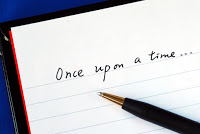Once Upon a Time Vocabulary
When you hear those four magical words, “Once upon a time…,” you are transported into a story’s world. You’ve probably heard reading to your child is good for language development. One reason listening to a story is good is that it helps him learn the “script” of a story. Listening to stories teaches a child about literary vocabulary – those words and phrases that we don’t usually speak, but hear in stories. We don’t generally speak phrases like “a land far away” and “happily ever after,” but reading helps a child understand their meaning and later use them in narratives.
Listening to and reading stories helps a child learn to tell a story. When I teach storytelling (narratives), I uses this framework:
- Use a starting phrase: “one day,” “long, long ago,” or “once upon a time.”
- Tell what the character usually does: everyday he _____.
- Something unusual happens: but today….
- What problem does this create?
- Now think of a solution to that problem.
- What happens in the end?
- Use an ending phrase: “the end,” “they lived happily ever after,” or “he learned his lesson”
 We first practice this script with stories that are familiar: Three Little Pigs, Goldilocks and the Three Bears or Little Red Riding Hood. Once they are able to use this format with familiar stories, we move on to creating original stories (narratives). Analyze stories you are familiar with using this format and then create your own story. The next time you read a book (children or adult), analyze the story phrases see what figurative language our students are expected to understand.
We first practice this script with stories that are familiar: Three Little Pigs, Goldilocks and the Three Bears or Little Red Riding Hood. Once they are able to use this format with familiar stories, we move on to creating original stories (narratives). Analyze stories you are familiar with using this format and then create your own story. The next time you read a book (children or adult), analyze the story phrases see what figurative language our students are expected to understand.

